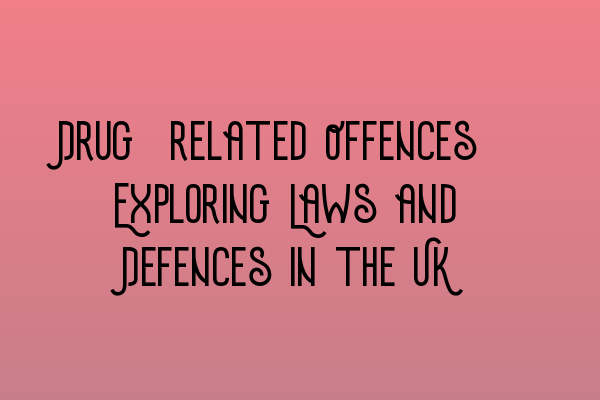Drug-related Offences: Exploring Laws and Defences in the UK
Drug-related offences are taken very seriously in the UK, and individuals who find themselves facing charges need to understand the laws surrounding these offences and the potential defences available to them. In this article, we will delve into the intricacies of drug-related offences in the UK, shedding light on the legal framework and providing insights into potential defences.
The Legal Landscape
The Misuse of Drugs Act 1971 is the primary legislation governing drug-related offences in the UK. This legislation categorizes drugs into three classes:
- Class A drugs, e.g. heroin, cocaine, and ecstasy
- Class B drugs, e.g. cannabis, amphetamines, and ketamine
- Class C drugs, e.g. tranquilizers, some painkillers, and steroids
The penalties for drug-related offences vary depending on the class of drug involved and the specific offence committed. For example, possession of a Class A drug can lead to a more severe punishment than possession of a Class C drug.
Common Drug-Related Offences
There are several common drug-related offences that individuals may be charged with. These include:
- Possession: This occurs when an individual knowingly possesses a controlled substance without a lawful justification. The penalties for possession can range from fines to imprisonment, depending on the class of drug and the quantity involved.
- Supply: This offence involves the sale, distribution, or transfer of a controlled substance to another individual. The severity of the penalty for supply varies, with higher quantities and Class A drugs typically attracting stricter punishments.
- Production: Producing or cultivating controlled substances is a serious offence, and those found guilty can face lengthy prison sentences.
- Importation/Exportation: Bringing drugs into the UK or exporting them from the country without proper authorization is illegal and can lead to severe penalties upon conviction.
Potential Defences
When facing drug-related charges, it is crucial to explore potential defences to mitigate the consequences. Some common defences include:
- Lack of Knowledge: Demonstrating that the accused had no knowledge of the presence of drugs can be a valid defence.
- Lawful Justification: If the accused had a lawful justification for possessing or handling the drugs, such as for medicinal purposes, it may be a valid defence.
- Procedural Errors: Challenging the legality of the search and seizure process can lead to evidence being suppressed and charges being dropped.
- Entrapment: If the accused was coerced or enticed into committing the offence by law enforcement agents, entrapment may be a valid defence.
It is important to note that the availability and success of these defences can vary depending on the circumstances of each case. Consulting with a qualified criminal defence solicitor is crucial to determine the best course of action.
Legal Representation for Drug-Related Offences
If you are facing drug-related charges in the UK, it is essential to seek legal representation from an experienced criminal defence solicitor. They will assess the details of your case, advise you on the best defence strategy, and represent your interests in court to achieve the best possible outcome.
At SQE Criminal Law & Practice Law UK, we specialize in providing expert legal representation for individuals facing drug-related charges. Our team of solicitors has extensive experience in defending clients against drug offences and will work diligently to protect your rights and secure the most favorable outcome. Contact us today for a confidential consultation.
For more information on related topics, you may find the following articles helpful:
